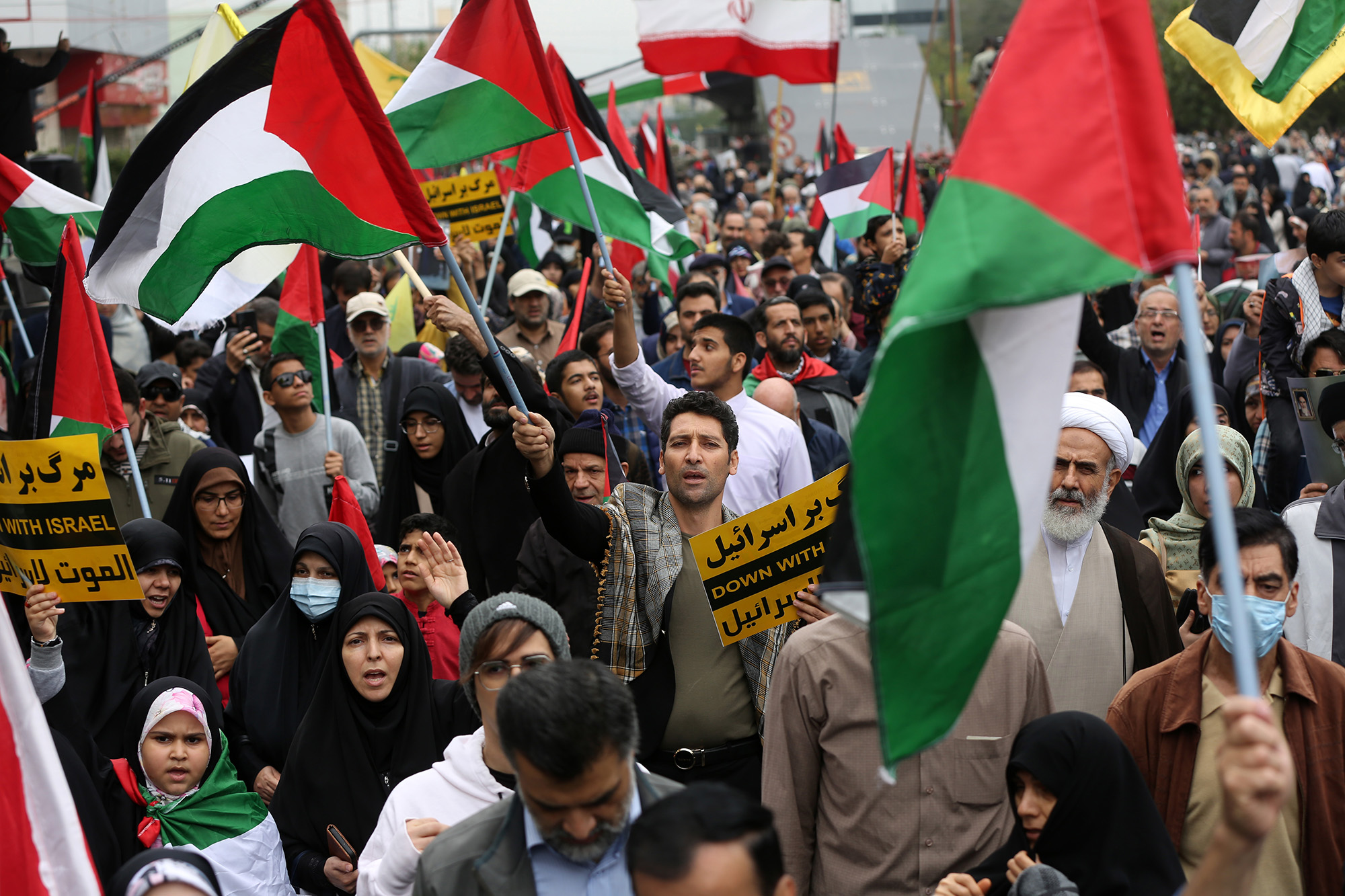Article, FEATURED STORIES, WORLD
Escalating Tensions: Israel Strikes Iran Amidst Gaza Conflict

TEHRAN, IRAN - OCTOBER 13: People attend the Pro-Palestine demonstration as they hold banners and flags at the Revolution street in Tehran on October 13, 2023. (Photo by Fatemeh Bahrami/Anadolu via Getty Images)
In a significant escalation of tensions, Israel launched a missile attack on Iran in the early hours of Friday, according to US officials. The strike, believed to be retaliatory in nature, follows weeks of mounting hostilities between the two nations. While the extent of the damage caused by the attack remains disputed, it marks a dramatic turn in the already volatile relationship between Israel and Iran.
The attack targeted the Isfahan region in central Iran, with conflicting reports emerging about the scale of the strike and the resultant damage. While US officials have confirmed Israel’s involvement, Iranian state media have downplayed the significance of the attack, stating that explosions heard in the Isfahan area were due to air defense firing at suspicious objects, with no reported casualties.
Iran’s Response and Warning
Iranian Foreign Minister Hossein Amirabdollahian told NBC News the drones took off from inside Iran and flew for a few hundred meters before being downed.
“They’re … more like toys that our children play with, not drones,” Amirabdollahian said.
“It has not been proved to us that there is a connection between these and Israel,” he said, adding that Iran was investigating the matter but that media reports were not accurate, according to Tehran’s information.
“If Israel wants to do another adventurism and acts against the interests of Iran, our next response will be immediate and will be at the maximum level,” Amirabdollahian said.
Amidst speculation about the type of weapon used in the attack, experts suggest that a two-stage missile, possibly air-launched, was employed. The strike comes in the wake of heightened tensions between the two nations, raising concerns about the potential for further escalation and the risk of a broader regional conflict.
Iran used hundreds of drones and missiles to directly target Israel last week in retaliation for an Israeli strike on the Iranian consulate in Damascus. It was the single largest drone attack ever carried out by any country, and it was the first time Iran directly attacked Israel after almost a half-century of being archenemies.
Iran’s supreme leader, Ayatollah Ali Khamenei, made notable remarks on Sunday, tacitly acknowledging that Tehran’s recent drone-and-missile attack on Israel may not have had the intended impact. Speaking before senior military leaders, Khamenei dismissed discussions about the effectiveness of the attack, emphasizing instead the symbolic significance of Iran’s military action on the international stage.
“Debates by the other party about how many missiles were fired, how many of them hit the target and how many didn’t, these are of secondary importance,’ Khamenei stated. “The main issue is the emergence of the Iranian nation and the Iranian military’s will in an important international arena. This is what matters.”
Secretary of State Antony Blinken told a group of American Jewish leaders on Tuesday that further escalation with Iran is not in the interests of either the U.S. or Israel, according to a report from Axios.
Meanwhile, the Gaza conflict adds another layer of complexity to the situation. Israel’s ongoing military campaign against Hamas, backed by Iran, has resulted in significant civilian casualties and raised international alarm. The latest Israeli airstrikes in Rafah, southern Gaza, have reportedly claimed the lives of at least 10 civilians, including women and children.
Israel’s assault on Gaza began after Hamas attacked Israel on Oct. 7, killing 1,200, according to Israeli tallies. Israel’s military offensive has killed 34,000 Palestinians in Gaza, according to the Gazan health ministry.
International Concerns and Diplomatic Efforts
As the situation continues to evolve, there are growing concerns about the humanitarian impact of the conflicts in Gaza and beyond. The escalating violence threatens to exacerbate an already dire humanitarian crisis, with thousands of Palestinians displaced and in urgent need of assistance.
The international community, including the US and European allies, has called for restraint and de-escalation, emphasizing the need to avoid actions that could further inflame tensions.
“We oppose a full-scale military operation of Rafah,” remarked foreign ministers from G7 countries.
In the midst of these challenges, diplomatic efforts to defuse tensions and facilitate dialogue remain crucial. However, the path to peace and stability in the region remains fraught with obstacles, and the coming days may hold further uncertainty and volatility.

